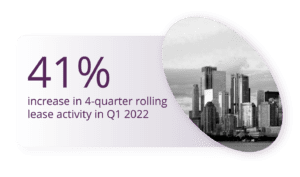JLL’s Future of work survey calls out the long-term transformation underway of real estate portfolios. Their survey of over 1,100 decision makers across 13 markets shows that companies are pursuing new strategic workforce opportunities and focusing investments to align with new objectives.
The research identifies the next three years as a critical phase for CRE strategy, and a determining one for how successful companies will be able to adapt to evolving market dynamics.
Key resulting messages from the research are:
- Hybrid working and the rejuvenation of the office
- Investing in quality space
- Environmental and social aspirations to shape the portfolio
- Doubling down on technology investments
- Real estate needs are more complex and sophisticated
When it comes to technology, survey respondents inform on technologies in place and for adoption. In fact, 78% of companies plan to adopt more than 10 anchor technologies across their operation. JLL states, “real estate without a robust technology and data investment strategy will not be competitive, resilient and forward-thinking.”
You can read the article in full here.
Office occupiers have signalled their intentions to keep increasing their flex-office portfolios. This is according to CBRE in an article written this month by their European research team. CBRE’s survey also shows that 41% of office occupiers plan to expand their office footprint over the next 3 years and that they believe investment in technology for the workplace drives productivity and business revenue.
You can read the article in full here.
JLL’s latest global real estate perspective report flags a number of headwinds that are driving greater uncertainty and low sentiment across sectors. For the office market, although leasing volumes increased 20% compared to last year, momentum overall has slowed.
The report includes an interactive graph comparing rental change across global cities and a short trend prediction for the office sector. Short-term, JLL predicts that uncertainty will decrease momentum in the market, while long-term, flexible and hybrid working considerations will impact real estate decision making. They also flag flexibility and quality as two pressure points for landlords as they seek to meet tenant demands.
Click here for the full report.

The Digital Cities Index (DCI) 2022 ranks 30 global cities against four key thematic pillars: digital connectivity, services, culture and sustainability. The whitepaper, developed by Economist Impact and supported by NEC, considers the extent and impact of digitisation across the leading digital cities. Asian cities like Singapore, Beijing, Sydney, Hong Kong and Seoul are amongst the top ten most connected cities in the DCI.
Read more here for highlights of the report and the best practices of leading cities and their deployment of digital technology.
Proptech shaping the future of real assets: APREA Leaders’ Congress 2021
Mingtiandi TV office strategies forum 2021: The future of the office
JLL’s latest report on workforce preferences examines hybrid working considerations that are critical to supporting employee expectations around new workstyles. The report is based on survey responses from over 4000 office workers across 10 countries and reveals office worker sentiment towards hybrid working.

Employees expect to spend more than half their time in the office, split between remote working options, and 60% believe that the office will remain central to their working life. 75% of respondents go to the office at least once a week, with 26% working exclusively from the office.
The report highlighted employee expectations around technologies in hybrid working environments to enable reliable connectivity, collaboration, and access to office services or facilities via tenant experience apps.
Read the report.
 2022 might just be the record year for capital deployment in real estate for Asia Pacific, as transaction volumes rise 20% year-on-year and are set to hit US$40.8 billion in Q1 2022. This strong performance is due to improving sentiment and recovery in key markets including Singapore, Australia and South Korea.
2022 might just be the record year for capital deployment in real estate for Asia Pacific, as transaction volumes rise 20% year-on-year and are set to hit US$40.8 billion in Q1 2022. This strong performance is due to improving sentiment and recovery in key markets including Singapore, Australia and South Korea.
Uncover key insights and the outlook for the APAC real estate sector in this report.
Read now.


In C&W’s latest global report, they revisit the future of the office and the realities that are shaping hybrid working strategies.
They delve into the increasing demand for office space, hybrid work and its implications for employee engagement and business performance, and the re-evaluation of the role the office plays for today’s businesses. Supported by numerous stats and scenario plans, the report underscores the need for companies to align their office strategies to these three realities.
Download the full report here.

